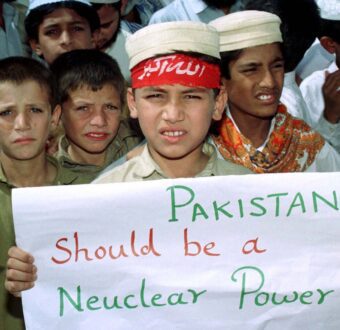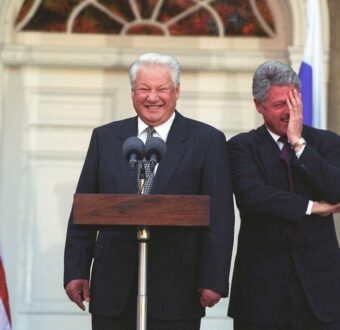Here’s one way Democrats can defeat Trump: be radically anti-war

For too long, Democrats have accepted the national-security establishment consensus. Voters are desperate for a different kind of foreign policy
By Mark Hannah and Stephen Wertheim
This article appeared in The Guardian on July 1, 2019.
President Trump is at it again. He promised to extricate the United States from endless war in the Middle East and still says that’s the goal. Yet he is taking almost every action, short of launching new invasions, to bring war upon us. In addition to defying Congress’s demand to cease support for the Saudi-led war in Yemen, he is holding the Iranian people hostage through draconian sanctions, demanding extreme and ill-defined concessions to make the suffering stop.
Trump’s schizophrenic foreign policy is almost too easy to criticize. It confounds Democrats much as Trump’s domestic policy did in 2016: the target seems so exposed that it’s actually difficult to land on a line of attack. In the first Democratic debates, candidates alternately accused Trump of accommodating adversaries (Russia and North Korea) and trying to crush them (Iran). Is the greater problem that Trump is alienating allies or that he’s indulging those like Saudi Arabia? The American people strongly disapprove of Trump’s handling of foreign policy, but they cannot hear every message at once.
Democrats have a unique opportunity to close the traditional national-security gap with Republicans, but only if they choose a clear direction for foreign policy and not just against Trump. They should listen to the American people and offer them a genuinely pro-peace message — standing firmly against Trump’s bellicosity as well as decades of bipartisan military intervention. This was the message some voters heard from Trump last time. Now Trump has failed to deliver, and Democrats can capitalize on that.
Case in point: the American public overwhelmingly supports Trump’s decision to call off airstrikes designed to retaliate against Iran after it shot down an American drone. A mere 36% favored a strike even in the heat of the moment, when Politico conducted a poll. The number was even smaller — 23% — among Democrats. Although the national-security commentariat casts Iran as a grave enemy, carrying on a grudge match that dates to the 1979 revolution that ousted the brutal, CIA-backed shah, ordinary Americans don’t nurse the same resentments. As a recent study found, a tiny minority, 8%, would opt for military action if Iran were to resume its nuclear weapons program. Six times as many would either tolerate a nuclear Iran while negotiations resumed or actually believe that Iran has the right to develop a nuclear deterrent.
Read more of Mark’s article in The Guardian.

Written by Mark Hannah
Mark is a senior fellow with the Independent America project at the Institute for Global Affairs and host of the podcast, None Of The Above.

Written by Stephen Wertheim
Stephen Wertheim is a senior fellow in the American Statecraft Program at the Carnegie Endowment for International Peace. Stephen is the former director of grand strategy at the Quincy Institute for Responsible Statecraft.
Read more from Mark
This post is part of Independent America, a research program led out by Jonathan Guyer, which seeks to explore how US foreign policy could better be tailored to new global realities and to the preferences of American voters.













Put America first but not alone